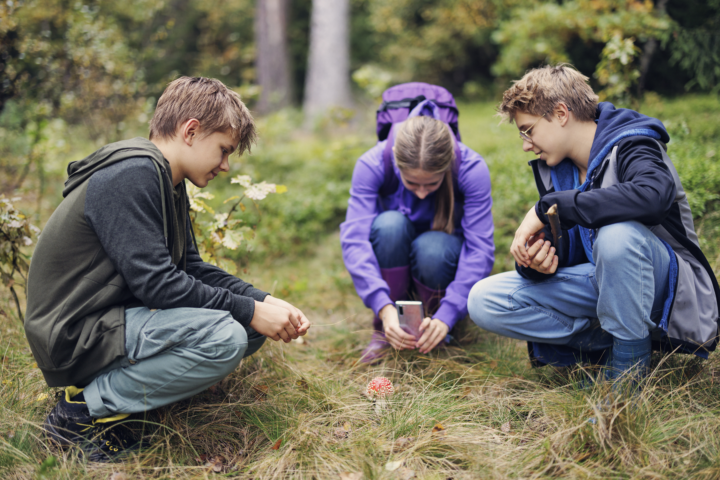Reading Nature: developing ecological literacy through teaching
Ola Magntorn har myntat ett nytt begrepp inom ekologi som han kallar att ”läsa” naturen. Förenklat innebär det att eleverna ska kunna förklara vad de ser i ett ekosystem och länka samman olika organismer med de processer som sker där. Och det kan eleverna lära sig, säger han – men bara om de får möjlighet att komma ut i naturen.
Ola Magntorn
Professor Gustav Helldén samt fil. dr Carolyn Boulter
Professor Michael Reiss, Institute of education, University of London
LiU – Linköpings universitet
2007-04-27
Reading Nature: developing ecological literacy through teaching
Institutionen för samhälls- och välfärdsstudier
Abstrakt
Avhandlingen handlar om hur olika grupper av elever utvecklar sin förmåga att ute i naturen kunna tolka och förklara hur ett ekosystem ser ut och varför det ser ut på ett visst sätt. Att läsa naturen handlar alltså om förmågan att känna igen organismerna och med kunskap om deras ekologi kunna förklara och beskriva naturen både på artnivå och på systemekologisk nivå. Det handlar också om att kunna se människans påverkan på ekosystemet.
Avhandlingen beskriver hur lärarstudenter och grundskoleelever utvecklar sin förmåga att Läsa naturen. Erfarenheter från tidigare forskning visar att ekologiundervisningen ofta blir teoretisk och saknar direkt koppling till de organismer och den natur som eleverna möter i sin omgivning. Utgångspunkten är att bedriva en stor del av undervisningen ute i ekosystemet och fokusera på några få arter. Med kunskap om arterna kan en systemekologisk förståelse byggas upp. Linnés starka fokus på arten och fascinationen för dess ekologi är en grundtanke som går igen i min avhandling där begreppet Maxima in minimis – att se det stora i det lilla är viktigt även idag. Med kunskap om hur våra vanliga ekosystem ser ut och fungerar kan också eleverna reagera på när naturen påverkats av människan på olika sätt.
I avhandlingen studeras även hur erfarna lärare ser på begreppet Läsa naturen och möjligheterna och begränsningarna med att ha denna förmåga som ett undervisningsmål. En förhoppning är att begreppet läsa naturen med dess starka koppling till att kunna känna sig hemma ute i naturen och förstå det man ser kan bli ett tydligare mål i kursplanerna i biologi.
Reading Nature: developing ecological literacy through teaching
In this study the concept reading nature and its contribution to science education is discussed. Some scientific concepts relevant for reading nature are defined. Reading nature has to do with the ability to recognise organisms and relate them to other organisms and to material cycling and energy flow in the specific habitat which is to be read. It has to do with authenticity where the natural world that we face outside is the book to be read and the tools we have are our experiences from previous learning situations both in and out-of-doors. The data in the study is based on the following student groups; student teachers, primary students in years 3-4 and secondary students in years 7-8. Finally a group of experienced teachers have contributed with data regarding their views on reading nature as a goal in science education. The aims of the study are to describe how the ability to read nature can develop among the different student groups and to extract critical aspects for this developing ability. The extent to which the ability to read nature can be transferred between ecosystems is another aim of the study. The relevance of reading nature as a goal in science education is also studied by discussing the concept with experienced teachers and student teachers.
Data was collected mainly by interviews before and after instruction. The students were interviewed outdoors and they were basically asked to describe the ecosystem and explain why it looked the way it did. The main issues discussed in the interviews regarded the organisms and the non biological factors influencing the ecosystem, the ongoing cycles and processes in the ecosystem and finally the human influence on the ecosystem. Concept maps and video recorded field studies has supplemented the interviews in the analysis of student ability to read nature.
Prior to instruction all students found it difficult to read nature. Linking ecological theory to the authentic environment seems difficult to do. The school students followed teaching sequences aiming at developing their ability to read nature. Critical aspects for developing the ability to read nature had to do with developing an ecological language including ecological terminology as well as the naming of common organisms. An experience based ecological knowledge of a few common species was for many students a helpful link between taxonomy and systems ecology. The recognition of the morphological and behavioural characters of different functional groups together with the principles of the food pyramid model and the cycling of matter were three critical aspects guiding the reading of nature in a new ecosystem. Abstract processes such as photosynthesis and natural succession were difficult to grasp for most students and the field based instruction did not seem to support this learning. There was a strong support for reading nature as a goal in science education where the outdoor aspect of ecology was stressed and the implications for this has to do with supporting the future generation of teachers to study nature in the real context.
Relaterade länkar

Biologi
 Åk 7–Vux
Åk 7–Vux Hållbar utveckling i förskolan
 Fsk
Fsk 




